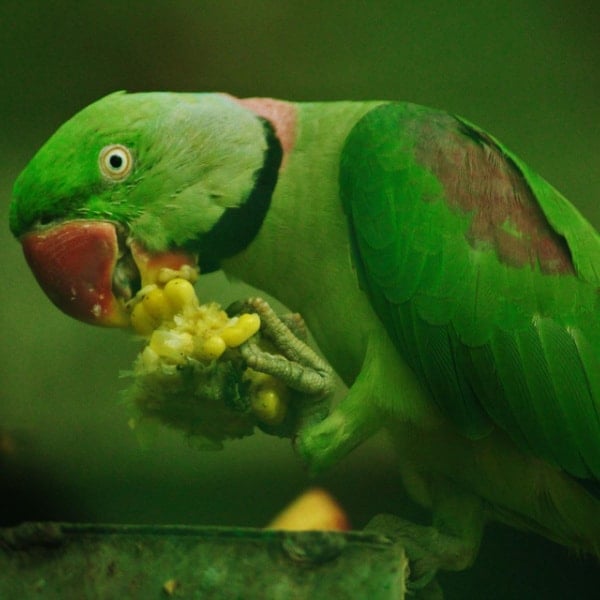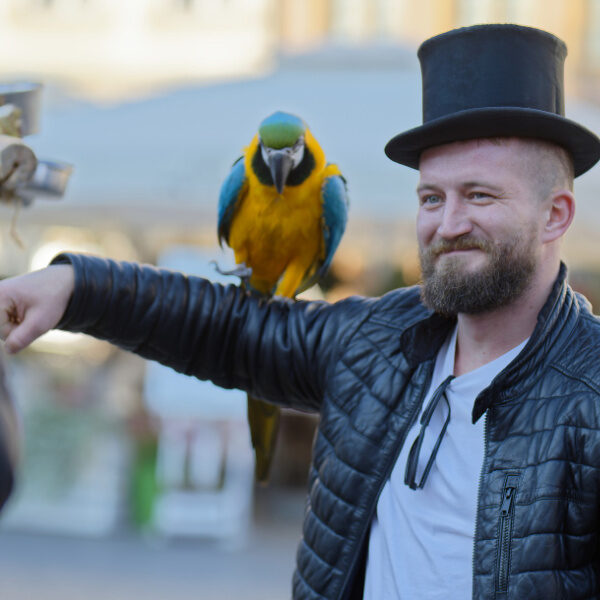Last Updated on by Mitch Rezman
First off, I love your site and am grateful to have found it. I like local shops, don’t shop Petco, and most pet stores don’t have a great bird section anyway.
I’m writing because I have a question about Bell, my quaker parrot. He squeaks. He didn’t used to, and it seems to be getting more pronounced. When he sleeps and sometimes when he eats – it just occurred to me that it must be a breathing thing. I should take him to the vet, maybe.
He’s been a healthy bird – doesn’t act funny or weird, sit on the bottom of his cage, huddle, or any of that. Plus he’s right next to me all day long (I work at home).
Although there are long periods of time when he doesn’t squeak either. Do you know anything about this?
He’s 17 years old. I feed him the natural (brown) pellets (Zupreem?) I know what the package looks like, but threw out the wrapper a few days ago) and ONLY organic veggies and fruit. Plus I eat healthy – no packaged food – though he’s so picky he sneers at most everything.
I’m grateful for any insight you have. Judi.
Hi Judi
If your bird is making sounds that are not normal, it is time to take it to the vet, an Avian Vet, not a dog and cat vet that is not trained for birds.
Is this happening in its breathing?
Where is the squeak coming from? Unless the bird is making this sound due to learning a new “sound”, it may have a lung issue that should be checked out.
It sounds like you are feeding him well. But even birds well cared for can become ill.
Don’t delay a trip to the vet.
Thank you
Catherine
After reading Catherine’s response it posed an opportunity for me to set the record straight on organic food for humans that we feed our birds… Nothing is as it ever seems to be, The world has gone crazy over organic everything. I’m going to tell you that just because it’s organic doesn’t mean it’s good, better or safer. I’m not “anti-organic”, I’m just “pro-knowledge”.
The organic bird food we sell in factory-sealed bags from Totally Organics or Harrison’s bird’s food is in fact healthy and safe for your bird. How do we know that? Feedback from you. We’ve been selling both of these products for many years with lots of positive feedback. Harrison’s can only be purchased through a veterinarian so we say it’s been vetted by a vet.
In all of those boutique stores, the food that I’m going to be talking about here is the food that you get from your local supermarket and farmers’ market. Trust me you want to be very careful when buying organic today.
Organic food is not pesticide free!
I’m not going to argue with you I’ll just give you the EPA page listing the many biopesticides authorized by the federal government for use on the growth of organic food and vegetables.
In 2014, there are more than 430 registered biopesticide active ingredients and 1320 active product registrations. We won’t get into the discussion of organic growth promoters. Using Science to promote growth in plants and animals – what could possibly go wrong – it’s organic AND scientific.
Then there’s the issue of contaminated water that may or may not be used to grow your organic produce – we just don’t know.
Our friend Gordon is a second-generation farmer here in Illinois who puts corn and beans into several thousand acres across four counties every year.
I asked him what his thoughts were about organic and he said “organic farmers use much more pesticide per acre than regular farmers”. If you can’t believe a farmer today who are you going to believe?
That organic kale that is in your paper shopping bag? The farm it comes from has a cute name and there are pictures of it and of the farm animals who all have names (how can you ever eat an Edward?) They don’t tell you if it’s next to a pig farm where the soil may have been breached with pig feces.
If an organic farm is anywhere close to a major metropolitan airport it may be the recipient of blue ice or even jet fuel being dumped over it prior to landing. You may want to look at a map so you can see where that kale is coming from.
“Not to worry you tell me – it’s grown locally right here in the city” to which I will point to one (of many) studies in this case by the Indiana University School of Medicine where researchers are studying lead levels in urban soil and found it raises concern for urban gardeners. You can read “Urban gardeners beware: There may be lead in your soil and food” – study here
We just don’t want you to delude yourself in the thinking because you’re paying that extra 20% or 30% for organic, that you’re actually getting a better product – because there is no guarantee that it’s better. Only that it’s USDA certified organic.
Here’s a slight digression to remind you that because the FDA is so overworked, the poultry industry is literally now self-policed due to the FDA not having time to visit all the processing plants. I also used to drink tap water here in Chicago coming from Lake Michigan 3 miles away.
That’s until I read recently about those polar fleece Northern face jackets (I get the lifetime guarantee thing). Turns out the microfibers keeping your tush warm in the winter separate from the clothing during washing and we now have some percentage of microfibers flowing into our drinking water system – they don’t know how to filter them out because they are too small for the water plant filters – they’re MICROFIBERS! – you’ve been warned – end of digression.
For a while, on Facebook, you couldn’t read a thread in any bird-related group where everybody was making “chop” for their birds. I looked at dozens and dozens of recipes and often wondered where the protein was coming from.
There are those that swore by feeding the birds “holistically” which sounds swell but if you look at Merriam Webster’s definition of “holistically” it states “relating to or concerned with complete systems rather than with individual parts” so I’ve never been able to wrap my head around how to feed a bird – holistically.” We recommend looking at your bird holistically but feeding it holistically, is a concept we are unfamiliar with and have no source for holistic bird food at the moment – but we’ll keep searching.
Occasionally we will ask someone in a bird-related forum “Why not just buy something off the shelf that is known to be scientifically designed to be nutritious for your bird?” a common retort was “I want my bird to eat like it would eat in the wild”.
When you begin to examine this I’m reminded of Mark Hagen the developer of Hagen bird food who says “It is not necessarily better to feed what birds eat in the wild to those in captivity. Many plants in the wild contain secondary plant compounds or are very low in many essential nutrients.
Some breeders have a romantic notion that captive diets which are complicated, labor-intensive, and using expensive ingredients are the most nutritious. Yet it is possible to feed easy to prepare, cost-efficient diets which do not compromise proper levels of essential nutrients”.Read the article in its entirety here
Written & Approved by
Mitch Rezman &
Catherine Tobsing
Author Profile
Latest entries
 Feeding Exotic BirdsDecember 29, 2025How to Switch or Convert Your Bird From Seeds to Pellets: Real-Life Case Studies and Practical Guidance
Feeding Exotic BirdsDecember 29, 2025How to Switch or Convert Your Bird From Seeds to Pellets: Real-Life Case Studies and Practical Guidance Feeding Exotic BirdsDecember 16, 2025A Practical, Budget-Smart Guide to Feeding Birds Well
Feeding Exotic BirdsDecember 16, 2025A Practical, Budget-Smart Guide to Feeding Birds Well Bird EnviornmentsDecember 7, 2025Understanding Budgie Cage Bar Orientation: Myths, Realities & Practical Solutions for Vertical-Bar Bird Cages
Bird EnviornmentsDecember 7, 2025Understanding Budgie Cage Bar Orientation: Myths, Realities & Practical Solutions for Vertical-Bar Bird Cages Feeding Exotic BirdsDecember 5, 2025How Dr. T.J. Lafeber Rewrote the Future of Pet Bird Nutrition
Feeding Exotic BirdsDecember 5, 2025How Dr. T.J. Lafeber Rewrote the Future of Pet Bird Nutrition




Michael Mattei
9 Mar 2025Very interesting article.
I’ll stick with the pellets portion. Kula gets a big plate every morning of a variety of fresh fruits & veggies. Some “organic” some local and some W/M. In the afternoon she gets her small bowl of L’Avian nuts & seeds along with some whole nuts. I’ve tried at least 3 times to get her to eat pellets by replacing her nuts & seeds. Or by mixing some pellets into the seeds & nuts. She always ignores them. I get it Kula, don’t bother she’s telling me.
Now if they made them to look like blueberries or pistachio nuts…